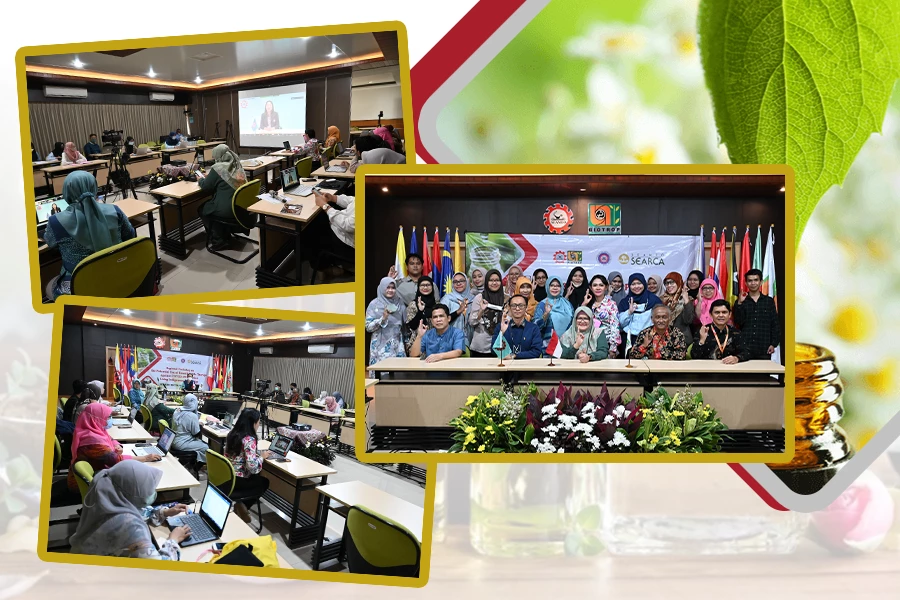Essential oils are a complex mixture of organic compounds coming from different plants and plant parts. Essential oils have been used for thousands of years not only as the ingredient of perfumes or as a seasoning for aromatized food, but also in folk medicine, because of their different biological properties, such as antibacterial, antifungal, and antiviral.
Since 2020, the outbreak of Covid-19 has been a common problem in the national, regional, and international levels. Several essential oils have been investigated for their potency to prevent the infection of Covid-19.
In general, the development of evidence-based therapy and treatment from herbal plants follows the research pathway for obtaining traditional knowledge, and conducting discovery, pre-clinical and clinical studies before obtaining regulatory approval. The final product, which either be a simple household product or products with therapeutic claims, will determine the type of data needed. However, several regulations need to be followed in producing the standard essential oils, which may be different for each country.
The regional workshop on “Potential Use of Essential Oils Therapy against Covid-19 Infection Using Indigenous Knowledge” was held on 7 October 2022 at the SEAMEO BIOTROP’s campus in Bogor, aiming at: 1) Obtaining information about the potential uses of essential oils in Southeast Asia based on indigenous knowledge; 2) Obtaining information about the market and value chains of essential oils in Southeast Asia; 3) Identifying the training needed in developing and producing essential oils; 4) Identifying the issues, policies, strategies, implementations, and recommendations surrounding the utilization of essential oils in Southeast Asia.
In achieving the objectives, the regional workshop discussed the potential use, market and technology of essential oils in Southeast Asia. A Focus Group Discussion was also held following the regional workshop to identify the issues, policies, strategies, implementations and recommendations surrounding the utilization of essential oils in Southeast Asia.
In his welcome remarks, Dr Arif Satria, the Rector of IPB University shared his expectation that the regional workshop would provide the solution of essential oils issues in Southeast Asia. The opening remarks of Dr Zulhamsyah Imran, the Director of SEAMEO BIOTROP, was presented by SEAMEO BIOTROP Deputy Director for Program, Dr Evelyn Bigcas.
The Regional Workshop was officially opened by the Director of SEAMEO Secretariat. “Before I open this workshop, I hope we will get the benefit inputs from the participants and resource persons to enrich the Regional Workshop on the Potential Use of Essential Oils Therapy against Covid-19 Infection Using Indigenous Knowledge. We do hope we could spend a significant session with you to stimulate necessary policies and actions among concerned institutions toward building a more inclusive society in the region. We believe, that our collaboration program is currently a critical concern in confronting the Southeast Asian region in general”, stated Dr Ethel Agnes Pascua Valenzuela, the Director of SEAMEO Secretariat.
Resource persons and materials presented at the Regional Workshop were:
- Dr Fides Z. Tambalo, University of the Philippines (Potential use of essential oils in Southeast Asia based on the indigenous knowledge);
- Dr Supriyanto, SEAMEO BIOTROP (Potential use of essential oils in preventing Covid-19 infection);
- Ms. Revina Rukmina Binol, MSc, PT Indesso Primatama (Sustainable supply and value chains of essential oil in Southeast Asia);
- Ms. Dewanti Subijantoro, General Manager of Rumah Atsiri Indonesia (Training need for the development of essential oil in Southeast Asia);
- Dr Celeste Querijero, CEO/President, CNQ Agricultural Consultancy, CNQ Herbal Product Manufacturing, Philippines (The cultural practice in cultivating the aromatic (aroma-therapy) plants).
The Regional Workshop was actively participated by more than 100 participants coming from the University of Forestry and Environmental Science of Myanmar, University of Philippines, PT Indesso Primatama, Rumah Atsiri Indonesia, Malaysian Agricultural Research and Development Institute (MARDI), Mindanao State University Philippines, Badan Pengawasan Obat dan Makanan (National Agency of Drug and Food Control of the Republic of Indonesia), SEARCA Philippines, CNQ Agricultural Consultancy, CNQ Herbal Product Manufacturing, Philippines, researchers, and university students.
 Monday, 10 October 2022 on 12:13pm
Monday, 10 October 2022 on 12:13pm